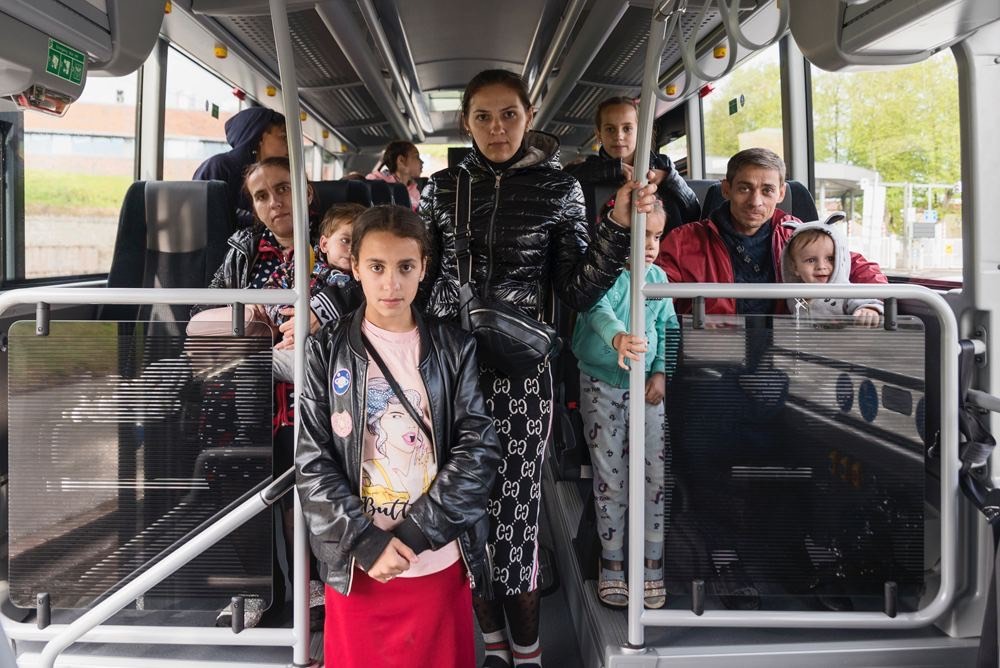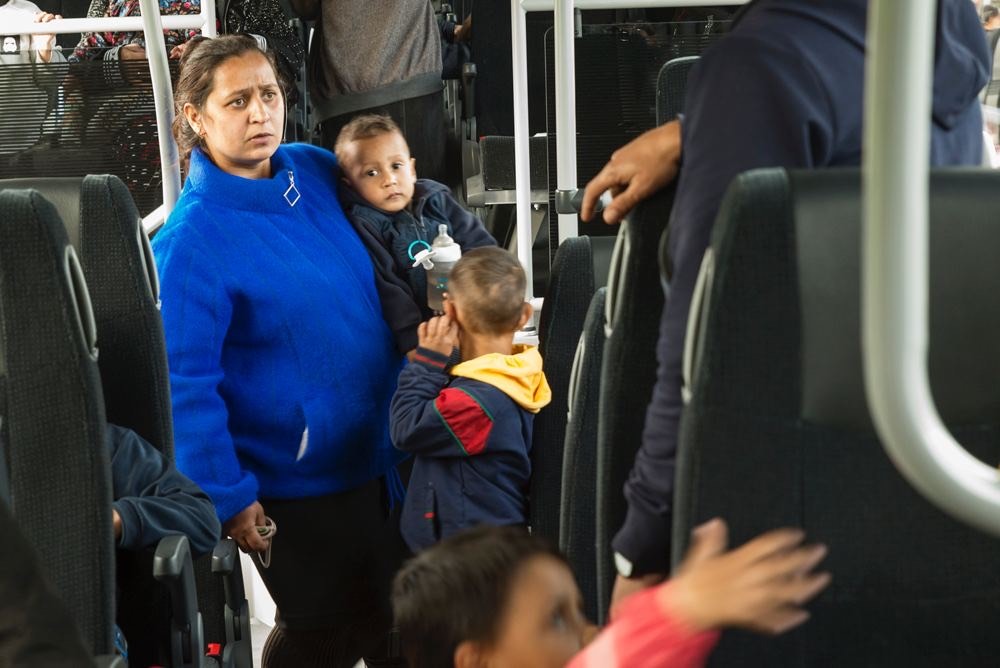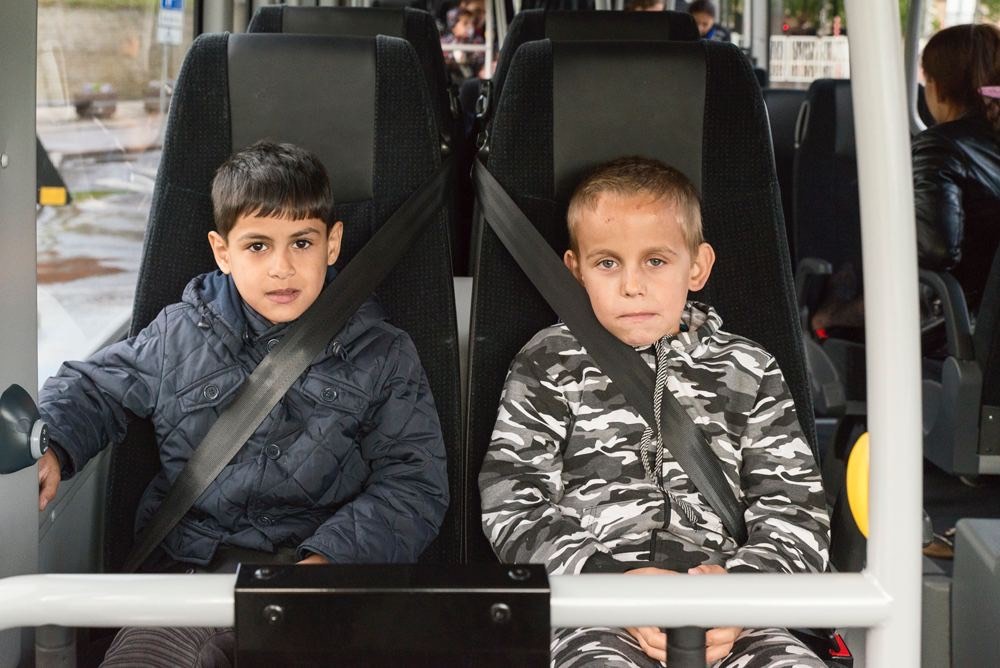On August 2, the world commemorates Roma who were victims of World War II. On this day in 1944, almost 4300 Roma died in gas chambers at Auschwitz-Birkenau in Nazi-occupied Poland. Decades later, Roma are again fleeing war, this time escaping Russia’s military aggression against Ukraine.
Since we published our report Romani Voices From Hell on International Romani Day (April 8, 2022), we have been tracking the development of events and the fates of those who shared their stories. Many of them are in a desperately difficult position. They left Ukraine and are seeking assistance in EU countries, where they frequently encounter various manifestations of xenophobia and discrimination. Others who decided not to flee abroad either moved to the Western part of the country or stayed home in Russian-occupied towns, facing deadly danger on a daily basis. Even in places where there are no active hostilities, there is still constant shelling and the situation is not stable. There are those who would like to return to the places where they used to live, because they have not found support or been given the chance to remain in European countries.
There have been cases when Roma families were forced to flee to Russia because that was the only way to save their lives. Later they were able to make their way to Europe with the help of volunteers. Roma from Mariupol who survived a long journey that ultimately ended in Germany told us a story like this. Their family group contained 11 adults and 25 children, from infants to adolescents. This interview with Kristina D. was recorded in Narva, Estonia in June 2022:

“We are all from Mariupol. We are all Kishinyovtsi Roma [a Romani sub-group]. There were 36 of us with our children. We are all from Levoberezhny District. We lived there in our own homes in a village-like settlement. There were about 160 of us. We lived in dense conditions, one right next to the other. We lived well. We had our problems, but we generally didn’t complain. We didn’t believe there would be a war or bombing up until the very last minute. We heard on the news that Russia was about to attack, but we remained calm. At 4 a.m. on February 24, we heard detonations and understood that they had started bombing us. One shell fell on my grandmother’s house; it is far from us, but the explosion sounded like it was right next door. We grabbed the children in whatever we were wearing and ran to my brother’s apartment. All our relatives gathered there. He has an apartment with a basement, so we were more or less safe from the shelling there.
This was in the morning. Then very heavy shelling began in the neighborhood where we were. Everything outside was rumbling, and the earth was shuddering. We hid in the basement when it started. We spent a week and a half there. The shelling was almost constant during this time, so it was terrifying to go outside. Then, when everything calmed down a week and a half later, we made our way to Kirov Street. One day Ukrainian soldiers came to us and said, ‘Gather your things. We will take everyone out through the corridor, we are letting everyone out. Go to the drama theater.’ We gathered everything we could and went to the theater, but the soldiers there told us: ‘Turn back… Russia won’t let you through.’ The city was already blockaded at that time. Negotiators tried to organize a corridor several times so we could leave, but nothing went right and we were not allowed to leave. After yet another attempt, we went to the Savona movie theater, because people said there was a large shelter there. It was already dangerous for us to return to our house, and we didn’t even know if it was still in one piece. There were also refugees at the Savona. Many people were in basements. And they came out to us with shovels. They refused to let us in. Do you understand? And when another round of bombing started, we just ran for the Central Market. It was quite far away, but we had no other choice. We were left with our children under the open sky. Shells were flying, planes. Houses were burning down right in front of our eyes and human corpses were strewn everywhere. We ran with our children in terror and cried.
We found a nine-story house with a basement near the market. A lock was hanging on the door, but we broke it and went in there to live. We were there for a while. From there, our men ran two or three blocks under fire for water, because there wasn’t any in our building. Our neighbors, who cooked on the street, shared their food with us. We had a small supply of food with us: some grits and vegetable oil…
There was bombing almost every day. It started around 9 p.m. or 10 p.m. and ended at 5 a.m. Or it could be the opposite – everything was quiet at night and the rumbling began around 5 a.m. and ended only around noon.
At one point tanks entered our courtyard. We were terrified of the soldiers. We didn’t know who they were, we didn’t see them, because most of us were in the basement all day long. A couple of women would go out to prepare food, but shelling would start a minute later, and then we would all sit around again waiting for it to be quiet. One day our Ukrainian soldiers came and said: ‘Don’t close the door to the bunker. Always leave it open’ We said: ‘How? We have lots of children’ And they said: ‘Don’t close the door! Otherwise we’ll throw a grenade in here and that’s it. We won’t look to see if there are children.’ They said they wanted us to always leave the door open so that other people could run in quickly if necessary and save themselves from the shelling.
We lived like that for about two weeks. When we ran out of food and had nowhere to get it from, we decided to leave at our own risk, because we understood that we would be killed there. It was terrifying, because many people had already perished by that time. My aunt and my grandfather died. A shell fell on the neighboring basement, which was about 500 meters from us, and people died, including children. People were hit by bombs several times right in front of our eyes. The day before we left – March 16 – the shelling lasted all night. We left on the morning of March 17, and we were later told that a shell hit the nine-story building where we had been hiding. The drama theater was also shelled that day.
We left on our own, in our own cars, which were still intact. There were about 40 of us. There were six cars. They were all crammed with people. Other Roma left Mariupol with us. There was a total of about 150 people. We headed in the direction of Kerch. From there, we decided to make our way to Rostov, to our relatives. It was already impossible to head in the direction of Ukraine – there were Russian soldiers everywhere, and they only let people through in the direction of Russia.

We went through 27 Russian checkpoints from Melitopol to Crimea, to Dzhankoi. We were stopped at each one, and our cars and our persons were thoroughly searched. They look at the men particularly carefully: They forced them to undress and looked for marks from gun butts. We didn’t get any sense of particular dislike from the soldiers. They treated us normally, but it was still terrifying every time the soldiers approached the cars and forced us to get out and explain who we were, where we were going, and so on.
We arrived in Kerch at 1 a.m. We stopped there to rest. Some people noticed us. They saw that our cars had Ukrainian plates and offered to help us. It turned out they were some kind of officials. We were put up in a hotel, where we spent the night and were fed. In the morning we went on to Rostov. The administration even offered an escort to Rostov, but we refused because we would have had to wait a long time and we were scared that there would also be shooting in Kerch. That’s how we ended up in Rostov. Our relatives took us in, and we lived there for almost two months. We were able to earn a bit of money there. We mainly worked in private gardens – digging and collecting trash for 100 rubles an hour. Then those who wanted to went on further. Some stayed in Rostov. Thirty-six of us decided to go to St. Petersburg and then on to the Baltics and then Germany. People said it was quieter there and you can earn a living. I have a son there. He went there and liked it. He said: ‘Mom, come here. It’s quiet, everything is good, people are treated normally.’ And in Russia we won’t be able to earn a normal living. We earned enough only for the trip, for tickets. We won’t survive here. We won’t be officially hired because we are Roma. We have a lot of kids. You have to pay an insane amount of money for housing.”
When leaving [Russia] for Estonia, Kristina D.’s cousin was held by Russian border guards for 24 hours, and the entire group had to wait for him:
He supposedly had a counterfeit passport. The stamp was faded or wasn’t visible. But all of our documents are originals. We all have identification numbers. We all have a set of documents. We received benefits at home – we would not have been able to without these documents. We were registered with social services. Even the mayor of the city knew us. No one ever picked on us. And all those checkpoints we went through! No one was ever suspicious of us. So we waited while they checked his information and issued a decision. We asked the Russian border guards: ‘Tell us, should we wait for him on the other side or not.’ And they said: ‘Well, they won’t shoot him, but they will put him in jail.’ ”

Nikolay crossed the border the next day. He said that he spent the night in the police precinct without food or water and that he was subjected to physical violence during his interrogation. His relatives waited for him in Riga. With the help of the volunteer group Friends of Mariupol, they all reached Liepāja together and then crossed by ferry to Germany. They had to spend the first two weeks on the street in Travemünde before they could be placed in a refugee camp.
The world has shown tremendous solidarity with refugees from Ukraine, but there have been cases where state services or volunteer organizations have refused to help Roma, accept them in temporary housing centers, or even let them into their cities. There have been cases where Roma were segregated after being placed in refugee camps in Moldova, the Czech Republic, and other East European countries.
Because they lack documents confirming their identity and Ukrainian citizenship, Roma often have problems receiving humanitarian or other aid, even though they stand out for their poverty in the flow of refugees. According to Juliana Wahlgren, a staff member at the European Network Against Racism, about 10% to 20% of Ukrainian Roma do not have citizenship or identification documents, which limits their access to international protection in the EU. In Hungary, Ukrainian Roma sometimes use baptism certificates as personal identification, but this doesn’t always help. Roma from Western Ukraine who have Hungarian citizenship are often refused support because they cannot register as refugees without Ukrainian citizenship. This means they remain on the streets without any help. For example, in May the Czech Republic adopted an amendment to a law concerning support for refugees that explicitly rejects temporary protection for EU citizens fleeing hostilities.
In Ukraine itself, Roma refugees also frequently have to deal with xenophobia, bias, and the authorities’ unwillingness to help: They are not given food to eat at assistance centers along the roads to safe cities, and conductors do not allow them on evacuation trains.
Volunteers from various community initiatives come to the rescue there and do the work that the state is unable to do. One of them – Nikolay Yurchenko – is the former head of the Lviv community organization Roma of Ukraine TernYpe, which helps internally displaced persons from Kyiv, Kharkiv, Donbas, and other regions of Ukraine affected by the combat. In an interview with the website Vgolos, he said that the Roma community in Lviv is helping refugees:
Roma in Lviv are housing internally displaced Roma. All the houses where Lviv’s Roma live filled up within 10 days. Almost 27 people were living in a two-story detached home. One Roma woman living in a two room apartment moved in with her older daughter and housed 15 people in her apartment, with the men in one room and the women in the other. Everyone slept on the floor and shared food, and no one complained. After all, the Roma were fleeing their cities under shelling just like other Ukrainians: They would pack up to 10 people in one car and leave without looking back for a safe place with no shooting.”
Roma from outside Kyiv and Kharkiv and from Luhansk and Donetsk oblasts fled to Lviv. According to Nikolay, just one week after the full-scale invasion, he received a call from Arena Lviv, where the city had set up a hub for displaced persons, asking him to help the Roma find housing and food. The hub had refused to work on the Roma’s problems.
“This really bothered me: Why did they decided to divide up displaced persons by ethnicity? Besides, we don’t have cultural centers where we could provide temporary shelter for Roma, let alone anyone. The members of our community in Lviv do not own hotels or restaurants. We found housing for everyone we could,” he said.
Roma families have many children, but right now no one is working on their socialization or psychological problems, even though the children are very depressed and feeling the war keenly. Roma children who are refugees do not attend online school, because they do not have the devices required for this.
According to Nikolay, local Roma in Lviv are meeting most of the displaced Roma’s needs for food products, personal hygiene products, and so forth at their own expense. They collect as much money as people can give, buy the required items, and package them. And on Saturday and Sunday, when they have free time, they take the packages around to people in need.
Nikolay stresses that the problem of internally displaced Roma is not new. He had to deal with this problem back in 2014, when Roma from Donetsk and Luhansk oblasts sought refuge in Lviv. Then, as now, officials in Lviv refused to provide these citizens with assistance, and they were forced to return to the occupied territories. Now history is repeating itself.
According to media reports, displaced Roma in Zarkapattia are also facing difficulties. A pastor at a church that organizes shelter for Roma said that at the beginning of the war, dozens of Roma who had no place to stay gathered at the Uzhgorod train station: “People came to the train station. The lived there for one day, two days, three. Are they (the authorities) blind? They take Ukrainians – from Kyiv, Kharkiv, and send them around to good places. But not the Roma – they were at the train station. As a result, the refugees were placed in Romani settlements. According to Miroslav Horvat, the leader of the Zarkapattia Roma and a deputy in the Uzhgorod City Council, from 3,000 to 5,000 Roma found shelter there.









 Feedback
Feedback